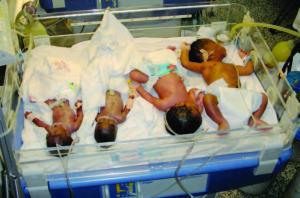This article was written by Heather Laura Clarke for the inaugural issue of Izaak Magazine – an in-depth, behind the scenes, all-access publication highlighting the incredible, everyday happenings at the IWK Health Centre. Dr. Ron George travels to Africa throughout the year to provide much needed prenatal and labour care to the women of Ghana.
Dr. Ronald George often witnesses women risking their lives to give birth in Ghana, where childbirth is truly a life-threatening experience. Conditions there are far different than those at the IWK Health Centre. “In Ghana, the maternal mortality rates are anywhere between 400 to 600 deaths per 100,000 live births. Unfortunately, during my brief visits to Ghana I have witnessed too many mothers die,” says Dr. George. “At the IWK, there is a chance I might see one or two deaths during my entire career.”
Dr. George is an anesthesiologist in Women’s and Obstetric Anesthesia at the IWK and Associate Professor of Obstetric Anesthesia at Dalhousie University. He also works with a group called Kybele — a non-profit, humanitarian organization dedicated to improving childbirth safety through educational partnerships and hands-on teaching.
Dr. George travels to maternity centres in Ghana two to three times a year as part of a team working to improve the care of women and children. He says Ghanaians know how unsafe childbirth is in their country and every one of them has been touched by a maternal death — whether it’s a sibling, or a close friend.
Kybele partners with Ghana Health Services and local health care practitioners to work on education and the introduction of new, safer practices. The partnership between Kybele and Ridge Hospital in Accra emphasizes assessment, implementation, advocacy and the measurement of outcomes and has reduced the maternal mortality from 496 per 100,000 live births in 2007, to less than 250 per 100,000 live births in 2011.
The partnership has also created a highdependency unit for high-risk mothers — women with severe preeclampsia or recovering from obstetric haemorrhage — other key causes of death in childbirth. Dr. George says their partners are “highly optimistic” with the positive results.
Building capacity for health providers in Ghana to develop their own set of skills in their own environment is another key piece of the puzzle. An example is the creation of a nurse anaesthetist school within Ridge Hospital in Accra, something Dr. George is proud to have contributed to. “It has allowed us to ensure that obstetrics and anesthesia care is taught appropriately at the start of their careers,” he says.
He also helps bring childbirth pain relief to women in Ghana — something he says is in high demand. On a recent trip, Dr. George met with a woman for whom Kybele had provided pain relief during the birth of her first child. Unfortunately, the team was back in North America when it was time for her second child to be born. “She told us how she had begged for pain relief during her second birth, but we were not there to provide it,” says Dr. George. “She kept asking when pain relief will be available for all women in Ghana. It was very moving to see that our efforts are appreciated.” Kybele is actively teaching and advocating for pain relief during childbirth.
Dr. George says he’s “very thankful” for the services he is able to provide women delivering at the IWK Health Centre in Halifax. “In Ghana, especially in remote areas, women die from very preventable things, and the rate of stillborn births is distressingly high,” says Dr. George. Always a moving part of his visits to Ghana, Dr. George was recently at the hospital during the weekly “first baby visit” for the new moms. “The mothers all show up in beautiful white dresses, which are traditionally their church outfits, and there is a lot of prayer and singing,” says Dr. George. “Some of the babies aren’t named right away, because they don’t know if they will survive. This is when they name their child, and celebrate that both the mother and baby have survived this initial week.”
To read the full issue of Izaak Magazine visit www.iwkfoundation.org/izaak.
Make a gift to the IWK Foundation.




